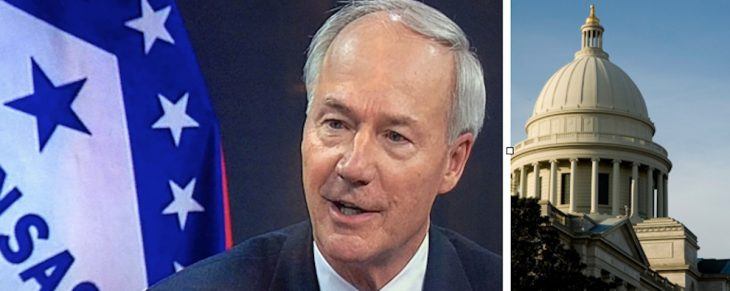Hutchinson: Trump’s protectionist talk a concern; opposes school choice bill
by January 26, 2017 7:24 pm 1,105 views

Gov. Asa Hutchinson is concerned about how President Donald Trump’s trade protectionist talk could affect Arkansas’ economy. He also opposes a bill creating education savings accounts from tax-deductible donations because a fiscal impact statement shows it would cost the state budget $10 million in its first year.
During a Thursday (Jan. 26) press availability in his office, Hutchinson was asked about the impact of President Trump’s presidency on global trade following the announcement that Mexico’s president has cancelled a meeting between the two world leaders.
“If the president is trying to develop a tough bargaining position, then hats off to him because we need to be tough in our negotiating on trade issues,” he said. “But I was concerned whenever I hear the word ‘protection’ in his inaugural address, and knowing how important to Arkansas global trade is, and the potential for higher consumer goods but also the potential for retaliation by our trading partners against our agriculture, that’s a great concern to me.”
He pointed out that 400 jobs are being “reshored” in Arkansas by a Chinese garment company that produces much of the sporting goods made for Adidas.
“We want those jobs to come back here, and we have an opportunity to capitalize on that in Arkansas, so I am concerned about going too far in setting up tariffs and creating a potential retaliation by other countries,” he said.
Hutchinson said Trump’s rhetoric must be distinguished from his actions. He was not concerned about Trump’s executive order canceling the Trans-Pacific Partnership Agreement because it indicated the administration simply was moving from multilateral to bilateral agreements. Hutchinson said he would be discussing the issue in February when he meets with Trump along with other governors.
SCHOOL CHOICE ACT
Hutchinson also said he would oppose the Arkansas Parental Empowerment for Education Choice Act of 2017 by Rep. Jim Dotson, R-Bentonville, which would allow nonprofits to establish education savings accounts for eligible students funded by tax-deductible donations.
Parents could apply to those organizations to establish those accounts and be funded equivalent to each academic year’s public school foundation funding, which is $6,646 in fiscal year 2017. That money could be used for a private school or a homeschool situation. The program would be limited to $10 million in tax credits in 2017.
A fiscal impact study released Wednesday by the Department of Finance and Administration reported that the bill would decrease state funding by $10 million its first year and by an uncertain amount in later years. Informed of the fiscal impact by a reporter during a press availability in his office Thursday, Hutchinson said he would oppose it. He said he had expected the bill would have a $10 million impact its first year.
“I will oppose the bill based upon that revenue hit because that’s not in budget,” he said. “I’m a strong proponent of choice. As everyone knows, I’ve had children go to public school, private school, Christian school, homeschool, and those are choices that parents make, but we have an obligation for the public school system of Arkansas to make sure it’s adequately funded.”
Hutchinson was also asked about the need for legislation to end so-called “sanctuary” cities and college campuses where immigration laws are not enforced. In response, he said working with federal law enforcement officials is the duty of a local law enforcement officer.
However, he said college campuses are a “greater concern” because federal laws apply to undocumented students. Telling universities that campus officers should enforce immigration laws “is difficult in a learning environment, particularly if you’ve got a student whose parents came here 15 years ago when they were just a young child and they’re American in every sense of the word, they’re going to school, and to be in a climate of potential confrontation with campus police that’s going to be knocking on the door and asking for your citizenship papers, I think that’s something we have to look at very closely.”
He said his administration had asked for thoughts and concerns from higher education officials.
